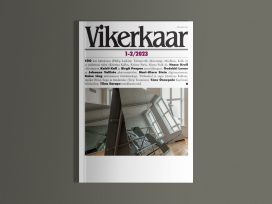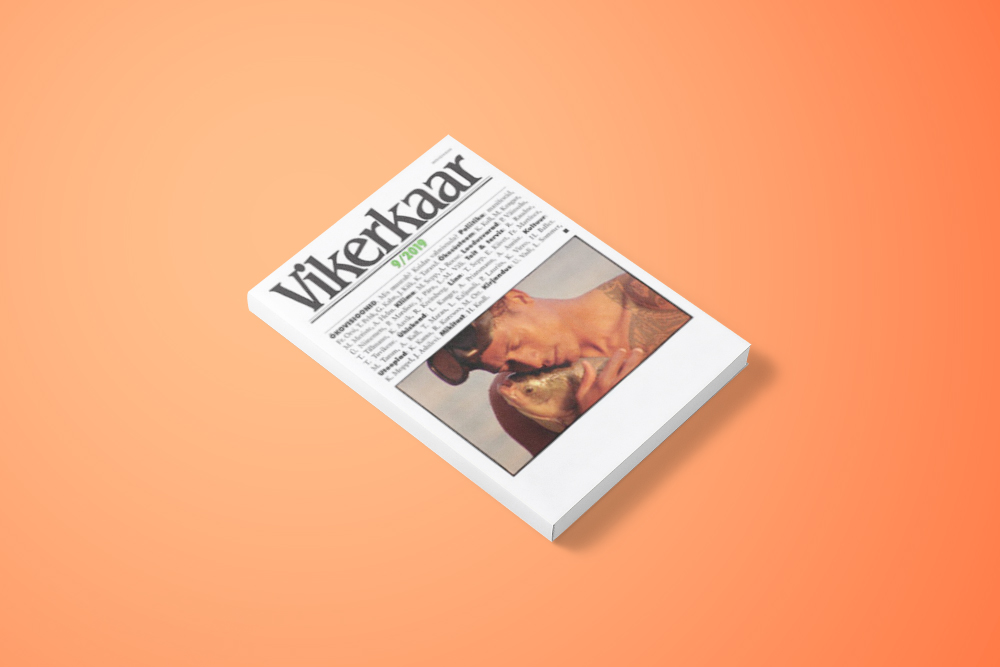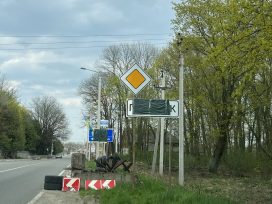
Clicks and tricks
Vikerkaar 1–2/2023
Why organised labour in Estonia is weaker than almost anywhere in Europe; how the gig economy could be made to work for labour; and what familiarity with everyday tools tells us about our plastic fork culture.
An Estonian perspective on planetary ecological crisis: environmental contamination, return of diseases, urban heat islands, diversity decline – but also solutions for the future: greening Soviet-era architecture, transformation of regional economies, tax reforms and more.
 As millions of people around the world strike to demand action on climate change, Vikerkaar asks scientists, activists and artists: how did we get here, and how do we move forwards? The issue takes an Estonian perspective on the planetary ecological crisis, discussing changes in climate, politics, culture, arts and economy – all precipitated by the Anthropocene.
As millions of people around the world strike to demand action on climate change, Vikerkaar asks scientists, activists and artists: how did we get here, and how do we move forwards? The issue takes an Estonian perspective on the planetary ecological crisis, discussing changes in climate, politics, culture, arts and economy – all precipitated by the Anthropocene.
Among the forty and more contributions are discussions of the contamination of waterways by agricultural runoff, oil shale mining and pharmaceutical waste; the return of diseases such as malaria, thought to be long banished from northern Europe; the emergence of urban heat islands, against which Estonians are unprepared; and the catastrophic decline in ecological diversity, which mirrors trends recorded in France, Germany and the US.
Not content with simply recording the damage, the issue also contains visions for the future: How might renovating Soviet housing projects offer a new model for resource-light urban development? Could eastern Estonia be rethought as a tourist hotspot to replace its destructive reliance on oil shale? Could cities be redesigned to support ecological diversity? What if we reformed taxation and supply chain management so that outsourcing carbon emissions to the global South would become impossible?
On what grounds could citizens be forced to accept the kind of massive collective action required to meet the challenge of global heating? Why would they vote for policies that do not benefit them directly, but only future generations, who are likely to be citizens of another country? Ethical philosopher Francesco Orsi argues that the answer is neither unprecedented nor undemocratic: ‘What the Anthropocene presents is not an intractable problem for democracy, but the more limited (though obviously difficult) issue of how uncompensated transfers of resources (i.e. sacrifices) for the sake of future generations of foreign citizens can be made acceptable to citizens.’
Nothing can be done, we are too late, civilization is doomed. The question is not ‘if’, but ‘when’. Anthropologist Aet Annist notes how climate fatalism is tied to global inequality – fearing the loss of one’s comfortable life presupposes that one has a comfortable life to start with. Crisis and fear produce radically different collective responses: a hope for individual survival over the bodies of others – or a demand for equality and justice across generations, both globally and within specific societies. The first will inevitably leave climate change itself in the background. A bad strategy: ‘not even extreme forms of inequality can guarantee the über-wealthy that their personal good life can continue’.
This article is part of the 17/2019 Eurozine review. Click here to subscribe to our reviews, and you also can subscribe to our newsletter and get the bi-weekly updates about latest publications and news on partner journals.
More articles from Vikerkaar in Eurozine; Vikerkaar’s website
Published 27 September 2019
Original in English
First published by Eurozine
Contributed by Vikerkaar © Eurozine
PDF/PRINTSubscribe to know what’s worth thinking about.

Why organised labour in Estonia is weaker than almost anywhere in Europe; how the gig economy could be made to work for labour; and what familiarity with everyday tools tells us about our plastic fork culture.

Should Russian literature be held accountable for creating a nationalist mood capable of inciting war on Ukraine? Calls for a halt on distribution include all works, whether colonialist or not. An Estonian perspective, built over five days in Ukraine, asks whether the Russian state is responsible for cancelling its own culture.